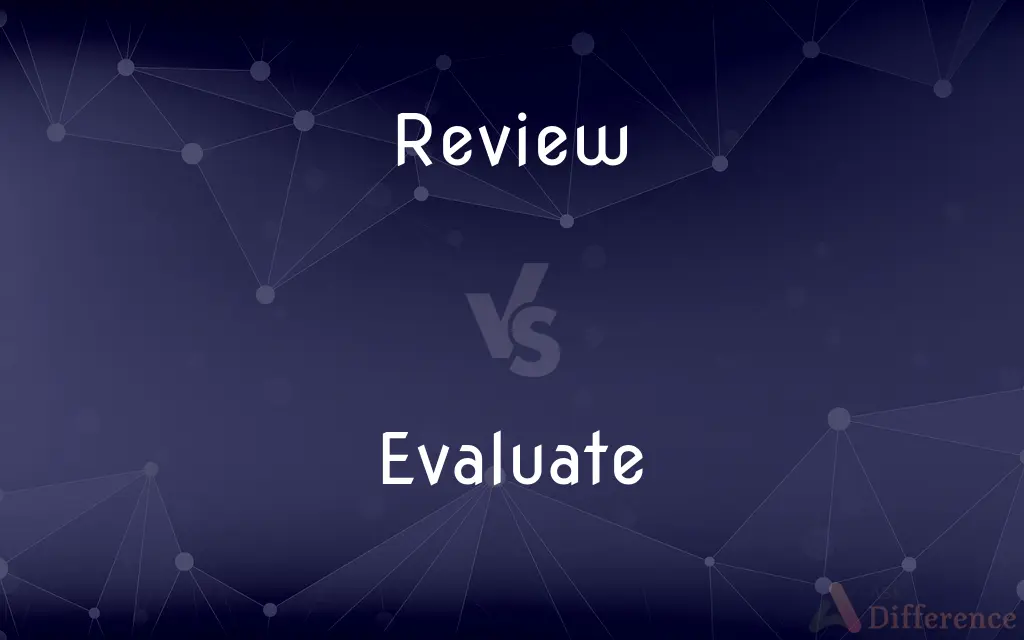Review vs. Evaluate — What's the Difference?
By Tayyaba Rehman — Published on September 1, 2023
Review means to examine or assess, while evaluate means to determine the worth or value of something.

Difference Between Review and Evaluate
Table of Contents
ADVERTISEMENT
Key Differences
Review implies a process of examining or looking over something, often with the intent to recall or summarize. Evaluate, on the other hand, carries an analytical tone where one assesses the quality, value, or importance of the matter at hand.
When you review a book, you may recount its plot, characters, and themes, offering a brief overview of its content. To evaluate the same book, you would judge its merits, considering elements like writing style, coherence, and overall impact.
If someone asks you to review a document, they may want you to check for errors, readability, or overall comprehension. If they want you to evaluate it, they're seeking your judgment on its effectiveness, relevance, or quality.
In an educational setting, students might review their notes to prepare for an exam. This involves going over material they've learned. However, when these students are asked to evaluate a concept or theory, they must critically assess its validity or applicability.
Businesses often review their performance over a specific period by looking at metrics or KPIs. This means they are examining the data. To evaluate their performance, they would determine how well they did in relation to their goals or compared to competitors.
ADVERTISEMENT
Comparison Chart
Purpose
To examine or look over.
To determine worth or value.
Nature
Descriptive, often recounting details.
Analytical, assessing quality or value.
Common Use
In literature or media discussions.
In educational or business performance contexts.
Depth
Often surface-level, focused on content.
Deep and critical, focused on merit or effectiveness.
Grammatical Function
Can be a noun (a review) or a verb (to review).
Primarily used as a verb (to evaluate), though it has a noun form (evaluation).
Compare with Definitions
Review
A formal assessment of something.
The movie received a positive review.
Evaluate
To determine the significance or worth.
She will evaluate the project's feasibility.
Review
An act of going over something again to refresh memory.
I did a quick review of the chapter before the test.
Evaluate
To judge the quality of something.
The teacher will evaluate the student's essay.
Review
An act of inspecting or examining.
The manager conducted a review of the security footage.
Evaluate
Form an idea of the amount, number, or value of; assess
The study will assist in evaluating the impact of recent changes
A system for evaluating how well the firm is performing
Review
A report that gives someone's opinion about the quality of a product or performance.
The new restaurant downtown has excellent reviews.
Evaluate
To calculate or reckon the value of.
The appraiser will evaluate the cost of the property.
Review
To write or give a critical report on (a new work or performance, for example).
Evaluate
Find a numerical expression or equivalent for (an equation, formula, or function)
Substitute numbers in a simple formula and evaluate the answer
Review
To examine with an eye to criticism or correction
Reviewed the research findings.
Evaluate
To fix the value of; to rate; to appraise.
Review
A retrospective view or survey.
Evaluate
Place a value on; judge the worth of something;
I will have the family jewels appraised by a professional
Review
An inspection or examination for the purpose of evaluation.
Evaluate
To assess the effectiveness or performance.
We need to evaluate our marketing strategies.
Review
A second or subsequent reading of a text or artifact in an attempt to gain new insights.
I need to make a review of the book before I can understand it.
Evaluate
To determine the importance, effectiveness, or worth of; assess
Evaluate teacher performance.
Review
(obsolete) To retrace; to go over again.
Evaluate
To consider or examine something to make a judgment.
The doctor will evaluate the patient's symptoms.
Review
To retrace; to go over again.
Shall I the long, laborious scene review?
Evaluate
To ascertain or fix the value or amount of
Evaluate the damage from the flood.
Review
A critical examination of a publication, with remarks; a criticism; a critique.
Evaluate
To compute or determine the value of (an expression).
Evaluate this integral.
Review
An essay or article that gives a critical evaluation (as of a book or play)
Evaluate
To return or have a specific value.
Review
A summary at the end that repeats the substance of a longer discussion
Evaluate
(Mathematics) To calculate the numerical value of; express numerically.
Review
(law) a judicial reexamination of the proceedings of a court (especially by an appellate court)
Evaluate
(transitive) To draw conclusions from examining; to assess.
It will take several years to evaluate the material gathered in the survey.
Review
A formal or official examination;
The platoon stood ready for review
We had to wait for the inspection before we could use the elevator
Review
Hold a review (of troops)
Review
A review is an evaluation of a publication, service, or company such as a movie (a movie review), video game (video game review), musical composition (music review of a composition or recording), book (book review); a piece of hardware like a car, home appliance, or computer; or softwares such as business software, sales softwares; or an event or performance, such as a live music concert, play, musical theater show, dance show or art exhibition. In addition to a critical evaluation, the review's author may assign the work a rating to indicate its relative merit.
Review
To look over, study, or examine again
Reviewed last week's lesson.
Review
To consider retrospectively; look back on
Reviewed the day's events.
Review
A reexamination or reconsideration.
Review
A restudying of subject matter.
Review
An exercise for use in restudying material.
Review
A report or essay giving a critical estimate of a work or performance.
Review
A periodical devoted to articles and essays on current affairs, literature, or art.
Review
A formal military inspection.
Review
A formal military ceremony held in honor of a person or occasion.
Review
(Law) An evaluation conducted by a higher court of a decision made or action taken by a lower court to determine whether any error was made.
Review
A musical show consisting of often satirical skits, songs, and dances; a revue.
Review
An account intended as a critical evaluation of a text or a piece of work.
The newspaper review was full of praise for the play.
Review
(legal) A judicial reassessment of a case or an event.
The victims demanded a full judicial review of the case.
Review
A stage show made up of topical sketches etc.
The Cambridge Footlights Review launched many Monty Python faces.
Review
A survey of the available items or material.
The magazine contained a review of Paris restaurants.
Review
A periodical which makes a survey of the arts or some other field.
The Times Literary Review is published in London.
Review
A military inspection or display for the benefit of superiors or VIPs.
The troops assembled for a review by the Queen.
Review
A forensic inspection to assess compliance with regulations or some code.
The regulators demanded a review against NYSE practices.
Review
To survey; to look broadly over.
Before I tackle the question directly, I must briefly review historical approaches to the problem.
Review
To look back over in order to correct or edit; to revise.
Review
To look over again (something previously written or learned), especially in preparation for an examination.
Review
(obsolete) To view or see again; to look back on.
Review
To view or see again; to look back on.
Review
To look back; to make a review.
Review
A second or repeated view; a reëxamination; a retrospective survey; a looking over again; as, a review of one's studies; a review of life.
Review
An examination with a view to amendment or improvement; revision; as, an author's review of his works.
Review
A periodical containing critical essays upon matters of interest, as new productions in literature, art, etc.
Review
An inspection, as of troops under arms or of a naval force, by a high officer, for the purpose of ascertaining the state of discipline, equipments, etc.
Review
The judicial examination of the proceedings of a lower court by a higher.
Review
A lesson studied or recited for a second time.
Review
A new appraisal or evaluation
Review
A subsequent examination of a patient for the purpose of monitoring earlier treatment
Review
(accounting) a service (less exhaustive than an audit) that provides some assurance to interested parties as to the reliability of financial data
Review
A periodical that publishes critical essays on current affairs or literature or art
Review
Practice intended to polish performance or refresh the memory
Review
Look at again; examine again;
Let's review your situation
Review
Appraise critically;
She reviews books for the New York Times
Please critique this performance
Review
Refresh one's memory;
I reviewed the material before the test
Review
Look back upon (a period of time, sequence of events, etc.); remember;
She reviewed her achievements with pride
Review
A periodic evaluation by a higher authority.
The employee's work will undergo a review next month.
Review
(Law) To evaluate (a decision made by or action taken by a lower court) to determine whether any error was made.
Review
To subject to a formal inspection, especially a military inspection.
Review
To go over or restudy material
Reviewing for a final exam.
Review
To write critical reviews, especially for a newspaper or magazine.
Review
To write a critical evaluation of a new art work etc.; to write a review.
The critic reviews every new play in London.
Review
To go over and examine critically or deliberately.
Review
A variety show with topical sketches and songs and dancing and comedians
Common Curiosities
Is "review" always a noun?
No, "review" can be both a noun (a review) and a verb (to review).
Can "evaluate" be used interchangeably with "review"?
Not always. While both involve assessment, "evaluate" often implies a deeper, analytical judgment.
In what context is "review" most commonly used?
"Review" is commonly used in literature, movies, or product discussions to express opinions or summaries.
Can businesses benefit from both reviewing and evaluating their strategies?
Absolutely. Reviewing provides an overview, while evaluating offers deeper insights into effectiveness.
Is "evaluation" the noun form of "evaluate"?
Yes, "evaluation" is the noun form of the verb "evaluate".
Can you review without evaluating?
Yes, you can review (or examine) something without necessarily determining its worth or value.
Are "book review" and "book evaluation" the same?
Not quite. A book review often summarizes and offers opinions, while a book evaluation judges the book's quality or merit.
Are there synonyms for "review" and "evaluate"?
Yes. For "review", synonyms include inspect, examine, and assess. For "evaluate", they include judge, rate, and appraise.
When should I use "review" over "evaluate" in a sentence?
Use "review" when you're discussing an overview or examination. Use "evaluate" when discussing a judgment of value or quality.
Why would someone evaluate a performance?
To determine its effectiveness, quality, or value.
Share Your Discovery

Previous Comparison
Yak vs. Buffalo
Next Comparison
Catholic vs. OrthodoxAuthor Spotlight
Written by
Tayyaba RehmanTayyaba Rehman is a distinguished writer, currently serving as a primary contributor to askdifference.com. As a researcher in semantics and etymology, Tayyaba's passion for the complexity of languages and their distinctions has found a perfect home on the platform. Tayyaba delves into the intricacies of language, distinguishing between commonly confused words and phrases, thereby providing clarity for readers worldwide.















































